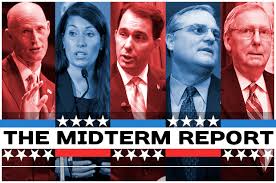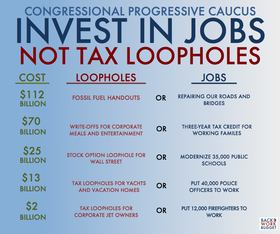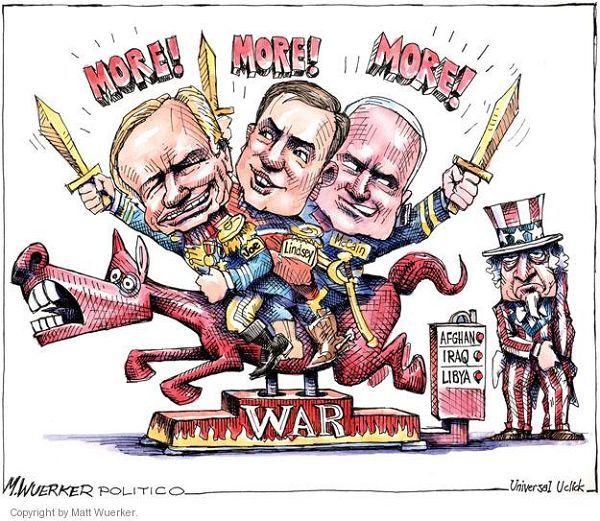
Progressive policies had success –?? too bad the party didn't run on them
 By Bhaskar Sunkara
By Bhaskar Sunkara
Progressive America Rising via al-Jazeera
Nov. 4, 2014 - From the outside, it looks as though American voters are more confused than ever.
On election day, they showed their concern about growing economic inequity by voting for ballot measures that increased the minimum wage. They proved their progressive values by supporting marijuana legalization, gun control and reproductive rights. In the same go, they elected Republicans in Senate and House of Representatives races, guaranteeing a GOP majority in Congress for years to come.
The disconnect seems difficult to grasp, though much of it can be attributed to low turnout and the fragmented nature of American politics, where national topics are often of little importance in local races.
District gerrymandering also played a role; the Democrats had more votes than their total number of seats would indicate. Republicans directly instigated the redrawing of congressional lines in many states over the past few years. As journalist Lee Fang notes, Democratic candidates in Pennsylvania won 44 percent of the vote, but secured only 27 percent of the state’s congressional seats.
Even so, a substantial level of Republican support is undeniable. Barack Obama has presided over an economic recovery that exceeds that of most European countries, but that still feels sluggish to most Americans, whose real wages and living standards have been stagnant or in decline for a generation.
Change isn’t on the way either: The president has been unable to follow through on the policy priorities he does have, even when he had a more favorable Congress early in his administration. And Obama’s chief legislative victory — health care reform — is inadequate and built around concessions to the private health insurance industry.
Obama, of course, does face a determined and organized right-wing opposition. The Tea Party may no longer be capturing headlines, but the organization and zeal they’ve injected into the Republican Party is undeniable. Their base is a tradition one for the American Right: middle-class and wealthy white men. As a whole, 64 percent of white males voted for Republicans, the largest margins in years. And this time around they were also joined by more women. Democrats still won more votes from women, but it was just by a margin of 5 percent, down from 11 percent in 2012.
There are huge swathes of the country with broadly social-democratic politics who are effectively to the left of most mainstream Democrats and feel left out by the party’s outreach.
Demographic shifts are often touted as proof that the Democrats should be able to maintain control of the White House. It is true that Asians, Hispanics, and blacks voted in such astounding numbers for Obama that he was able to win comfortably with only 39 percent of the white vote. And with advantages among young people and continued inroads into the Sun Belt, trends still favor the Democrats. Republicans, on the other hand, have increasingly become a regional party wedded to the antiquated rhetoric of white identity politics.
But at the local level the Republican Party remains better able to mobilize and turn out its supporters in midterm elections. The formula could mean a rightward lurch at the national level, even if Hillary Clinton eases to victory in 2016.
The response of mainstream Democrats to the present situation essentially boils down to blaming young people and minority voters — who support them every four years in presidential elections but “don’t care enough” to show up in off years. They speak of a crisis of politics and voter apathy in sweeping terms, while barely mentioning their own shortcomings.
But there’s a good reason why people turn out and support measures such as minimum wage laws when they’re on the ballot: They’re not idiots. They understand the policies that will make their lives and the lives of other working people better and they know that it’s important to support them.
But Democrats didn’t offer enough such proposals. Instead, most Democrats were satisfied with reassuring voters that they weren’t Republicans. It’s hard to think of a candidate from the party who spoke broadly in moral and ethical terms, presented their vision of a good society and how we could reach it. This should come as no surprise; the Democrats are too tied to moneyed interests and too disconnected from labor and pressure from social movements to embrace progressive politics consistently or to be anything other than tepid centrists.
By contrast, the other side of the political spectrum, in the tea party-influenced Republican Party, shows the power of a consistent and ideological politics that motivates its base to get out and vote every November.
Don’t get me wrong: There isn’t a commanding progressive majority just waiting to see radical candidates on the ballot. But there are huge swathes of the country with broadly social-democratic politics who are effectively to the left of most mainstream Democrats and feel left out by the party’s outreach. Once organized and engaged, they can change American politics. But they’re going to need a more compelling reason than the tired biannual sell “Look at at us, we’re not Republicans.”
Bhaskar Sunkara is the founding editor of Jacobin.
The views expressed in this article are the author's own and do not necessarily reflect Al Jazeera America's editorial policy.
Read More...
Summary only...






 By Bhaskar Sunkara
By Bhaskar Sunkara  By Bill Fletcher, Jr
By Bill Fletcher, Jr


![[PDA - Heathcare NOT Warfare - Sign the Petition.]](http://pdamerica.org/images/ads/HealthNotWar_final.jpg)


